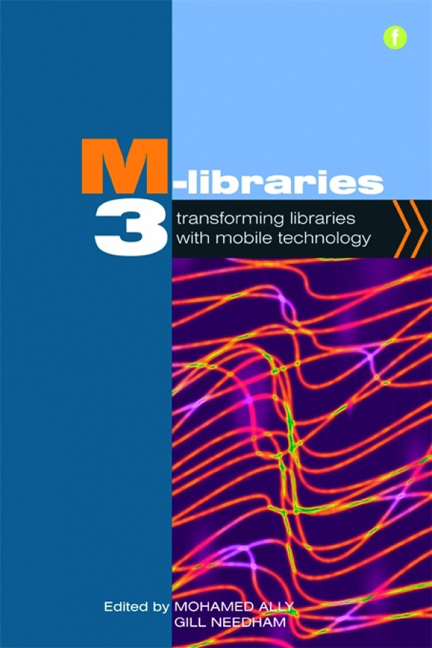Book contents
- Frontmatter
- Contents
- Acknowledgements
- Contributors
- Foreword
- Introduction
- 1 Education for all with mobile technology: the role of libraries
- PART 1 DEVELOPING MOBILE SERVICES
- 2 Preparing for the mobile world: experimenting with changing technologies and applications for library services
- 3 Enhancing open distance learning library services with mobile technologies
- 4 Use of mobile phones in the delivery of consumer health information
- 5 Deploying an e-reader loan service at an online university
- 6 Mobile service providers and library services in a multi-campus library
- 7 Using mobile technology to deliver information in audio format: learning by listening
- 8 Sound selection: podcasts prove positive
- PART 2 PEOPLE AND SKILLS
- PART 3 FOCUS ON TECHNOLOGY
- Conclusion
- Index
7 - Using mobile technology to deliver information in audio format: learning by listening
from PART 1 - DEVELOPING MOBILE SERVICES
Published online by Cambridge University Press: 08 June 2018
- Frontmatter
- Contents
- Acknowledgements
- Contributors
- Foreword
- Introduction
- 1 Education for all with mobile technology: the role of libraries
- PART 1 DEVELOPING MOBILE SERVICES
- 2 Preparing for the mobile world: experimenting with changing technologies and applications for library services
- 3 Enhancing open distance learning library services with mobile technologies
- 4 Use of mobile phones in the delivery of consumer health information
- 5 Deploying an e-reader loan service at an online university
- 6 Mobile service providers and library services in a multi-campus library
- 7 Using mobile technology to deliver information in audio format: learning by listening
- 8 Sound selection: podcasts prove positive
- PART 2 PEOPLE AND SKILLS
- PART 3 FOCUS ON TECHNOLOGY
- Conclusion
- Index
Summary
Introduction
Libraries globally are exploring ways to deliver the myriad of quality information resources available to their users – via mobile devices. As well as focusing on documents (with the inherent problems associated with reading on small screens), Southern Cross University (SCU) Library has explored ways of accessing key documents and converting them to audio form, so that students and staff have an alternative way of engaging with academic literature.
Learners today exist in an increasingly multimodal environment. Mobile devices provide them with extra levels of flexibility, offering them both auditory and visual input and allowing them to learn anytime, anywhere and while doing anything. As Eisenwine and Hadley (2011, 5) state, ‘the digital generation prefers parallel pro - cessing and multitasking as a way of digesting information. In addition, that generation prefers pictures, sounds and video over text.’
Traditionally, academic libraries have provided access to predominantly text-based materials. With a highly mobile cohort, however, the problems inherent in viewing or reading on small screens, combined with the need to support different learning styles, have provided the impetus for exploring audio-based alternatives to the academic literature.
As SCU Library staff worked towards the development of a mobile platform, they simultaneously explored the provision of text-based audio files within that platform and the University's learning management system.
Read, listen and learn
The pedagogical value of providing audio-based resources, especially podcasts, has been well documented (Hew, 2009; Kervin et al., 2006; McGarr, 2009; Tempelhof, et al., 2009). Generally, such podcasts have been based on lecture materials or supplementary materials designed to support specific units. Other examples include the provision of conference or workshop presentations. Little has been written evaluating the use of audio forms of published and/or scholarly literature.
Between 2008 and 2010, database vendors began providing audio files of selected academic literature. Factiva led the field with linked audio files for all its articles (of less than 4000 words). EbscoHost and Gale Cengage followed suit, providing audio files for full-text HTML documents, but not for PDF files. All three vendors provided an immediate ‘listen’ function and the facility to download an MP3 version. Ironically, despite being the provider of the first mobile database platform, EbscoHost disabled the ‘audio’ function for mobile devices. Ebook Library (EBL) provided a ‘read aloud’ facility within its e-book collection, but not downloadable MP3 files.
- Type
- Chapter
- Information
- M-Libraries 3Transforming libraries with mobile technology, pp. 57 - 64Publisher: FacetPrint publication year: 2012



